12 Best Platforms for Remote DevOps Engineer Jobs in 2025
Find the best remote DevOps engineer jobs in 2025. Our curated list covers top job boards, platforms, and freelance sites with actionable tips.

The demand for skilled DevOps engineers who can build, automate, and maintain robust infrastructure from anywhere in the world has never been higher. As companies accelerate their cloud-native adoption, finding the right platform to connect with top-tier opportunities is a critical first step. This guide moves beyond generic lists to provide a technical, actionable breakdown of the 12 best platforms where you can find high-quality remote DevOps engineer jobs.
We will analyze each platform's unique value for engineers specializing in Kubernetes, Terraform, CI/CD pipelines, and cloud security. This is not just a list; it is a strategic playbook designed to help you navigate the modern hiring landscape. You will learn which platforms are optimized for full-time roles with specific tech stacks (e.g., AWS vs. GCP) versus those tailored for freelance contracts focused on tasks like Helm chart creation or Prometheus/Grafana setup.
For those specifically targeting the DevOps field, exploring dedicated remote DevOps job listings can provide a wealth of opportunities. Throughout this resource, we'll equip you with the tactical edge needed to secure your next high-impact remote role, complete with screenshots and direct links to get you started immediately. We cover everything from elite talent platforms to specialized job boards, ensuring you can find the perfect match for your skills and career goals.
1. OpsMoon
OpsMoon operates not as a conventional job board but as a premium DevOps services platform, offering a strategic advantage for companies seeking top-tier talent. It connects businesses with an elite, pre-vetted pool representing the top 0.7% of global remote DevOps engineers. This model is ideal for organizations that need more than just a hire; they need a comprehensive, managed solution to accelerate their software delivery lifecycle and enhance system reliability. The platform is particularly effective for startups and SMBs needing to implement robust DevOps practices—like GitOps with ArgoCD or a full observability stack using OpenTelemetry—without the overhead of building an in-house team from scratch.
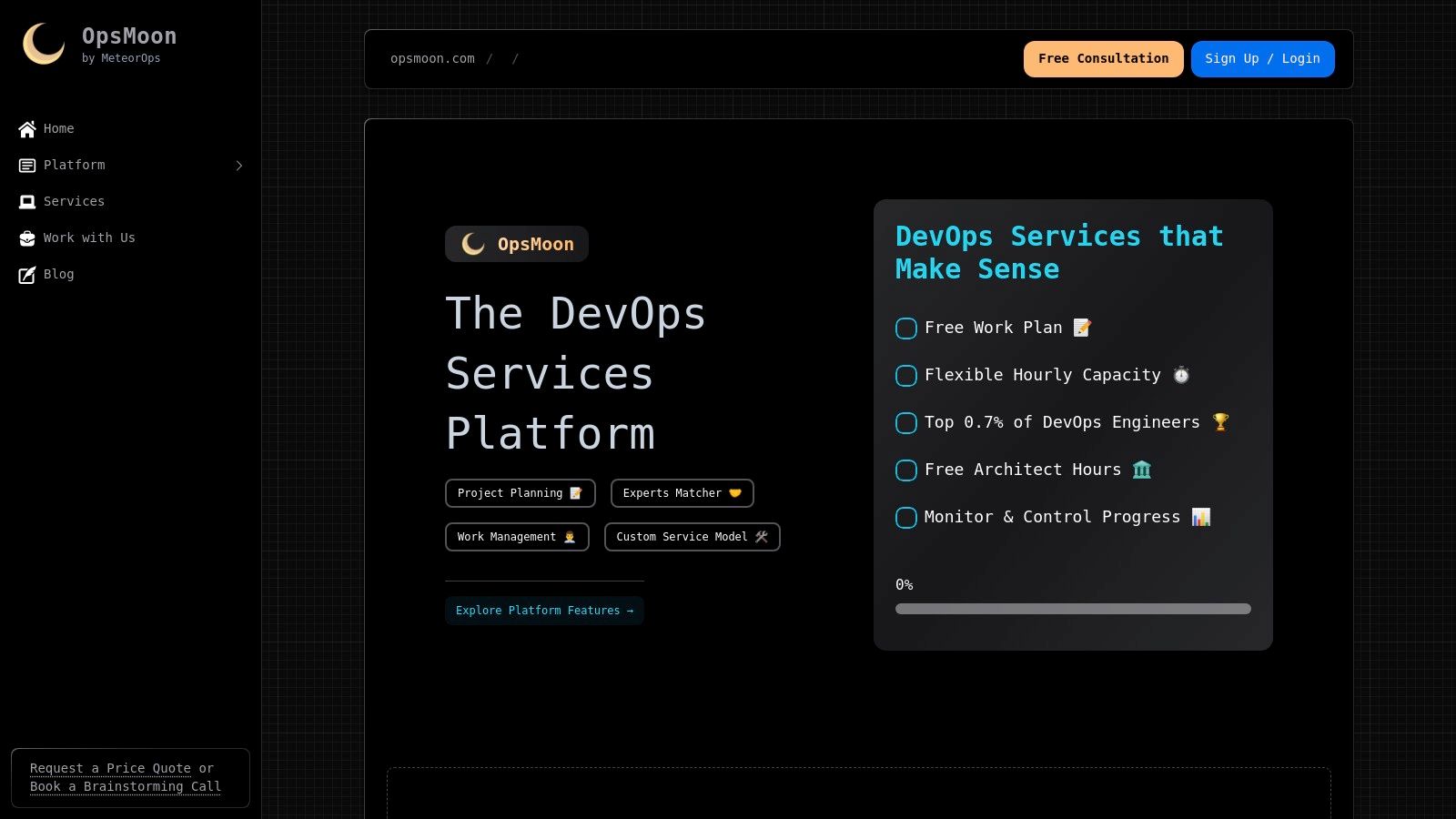
What truly distinguishes OpsMoon is its structured, end-to-end engagement process. It begins with a complimentary work planning session to assess your current DevOps maturity, define clear objectives, and build a technical roadmap. Their proprietary "Experts Matcher" technology then pairs your project with engineers who have proven expertise in specific technologies like Kubernetes, Terraform, and advanced CI/CD automation.
Key Features & Use Cases
- Managed Project Delivery: OpsMoon provides a fully managed service, from initial strategy to ongoing support. This is a powerful alternative for CTOs who need guaranteed outcomes for complex projects like a full cloud migration from on-prem to AWS, an infrastructure overhaul using Terraform modules, or building an observability stack from the ground up with Prometheus, Grafana, and Loki.
- Flexible Engagement Models: The platform supports various needs, including high-level advisory consulting for strategic guidance (e.g., architecting a multi-cloud strategy), full project delivery for turnkey solutions (e.g., deploying a production-ready EKS cluster), or scalable hourly capacity to augment your existing team during critical sprints.
- Technical Specialization: Clients gain access to engineers specializing in cutting-edge toolchains. Whether you need to orchestrate complex microservices with Kubernetes, implement Infrastructure as Code (IaC) with Terraform and Terragrunt, or optimize release pipelines with GitLab CI and custom runners, the platform ensures precise skill alignment.
Why It Stands Out
OpsMoon excels by blending elite talent with a structured, transparent process. The inclusion of free architect hours provides strategic oversight, while real-time progress monitoring ensures you maintain control and visibility. This model effectively de-risks the process of finding and managing high-caliber remote DevOps engineer jobs by packaging talent, strategy, and project management into a single, cohesive service. While pricing requires a direct consultation, this approach ensures a tailored solution that aligns with specific technical and business goals.
For engineers seeking project-based work, OpsMoon offers a unique path to high-impact remote jobs with leading tech companies.
Website: https://opsmoon.com
2. FlexJobs
FlexJobs distinguishes itself through a rigorous, human-powered vetting process for every single job posting. Unlike aggregators that scrape listings automatically, FlexJobs guarantees that every opportunity is legitimate, professionally-oriented, and offers some form of flexibility, making it a reliable source for high-quality remote DevOps engineer jobs. This manual curation eliminates scams and commission-only roles, saving you significant technical search time filtering out irrelevant noise.
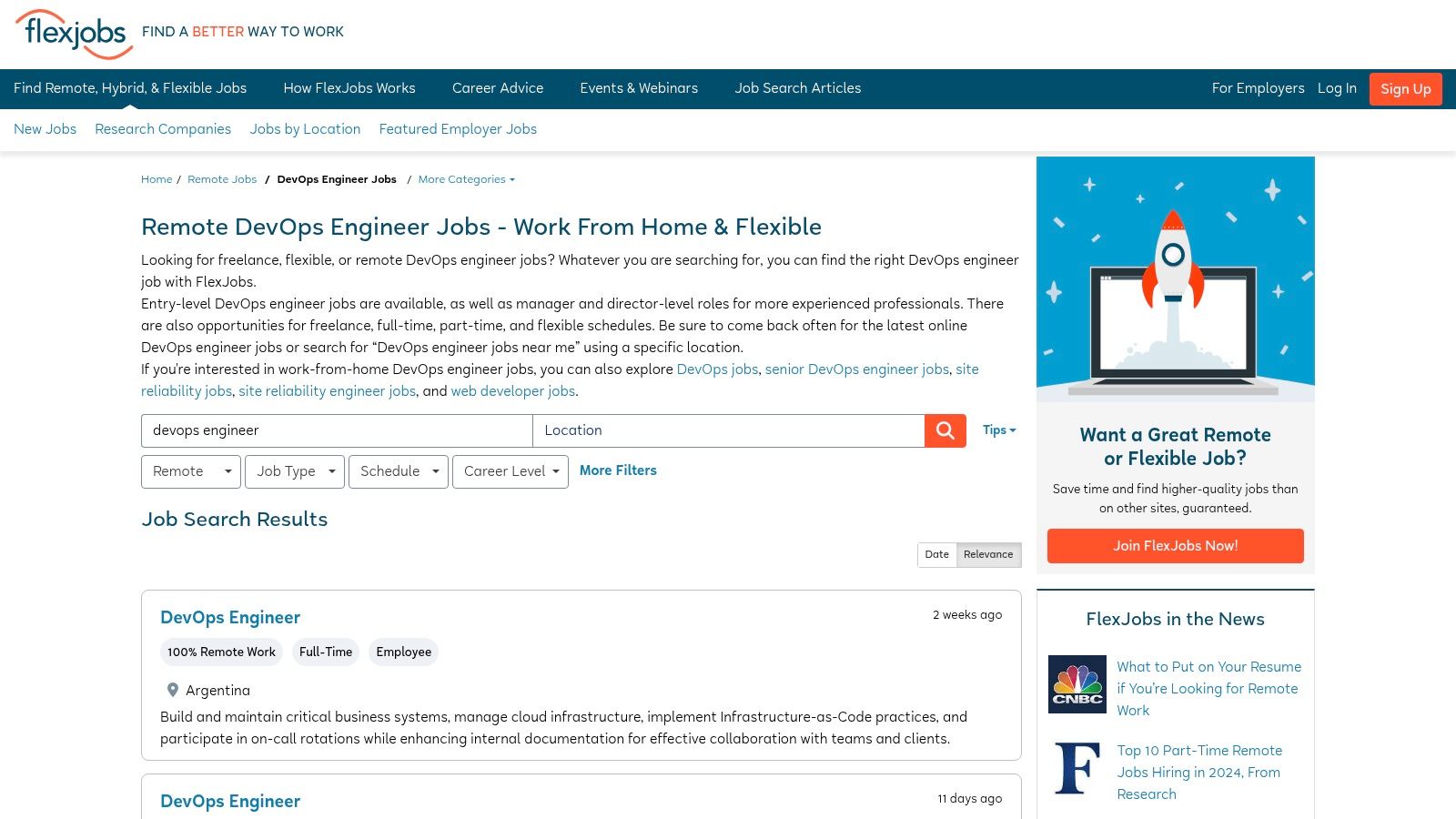
The platform's primary drawback is its subscription model. Full access to job details and the ability to apply requires a paid membership. However, this paywall acts as a filter, often resulting in a less saturated pool of applicants for each role. For DevOps engineers serious about finding a fully remote or flexible position, the fee can be a worthwhile investment for access to verified, high-caliber opportunities that require skills in areas like cloud cost optimization (e.g., AWS Savings Plans, Spot Instances) or security automation.
Maximizing Your FlexJobs Search
To get the most out of FlexJobs, leverage its advanced search filters. You can narrow results by "100% Remote," "Hybrid Remote," or even by specific location-agnostic time zones. For a technical search, use boolean operators in the keyword field, such as ("DevOps" OR "SRE") AND ("Kubernetes" OR "EKS") AND "Terraform". Take advantage of the platform's career resources to sharpen your application strategy and stand out to hiring managers.
- Pros: Hand-screened, scam-free job listings; excellent search filters for flexibility; career development resources.
- Cons: Subscription fee required for full access to apply for jobs.
- Website: FlexJobs DevOps Engineer Listings
3. LinkedIn
LinkedIn has evolved from a professional networking site into a dominant force in the job market, making it an essential platform for finding remote DevOps engineer jobs. Its primary strength lies in its sheer scale and the integration of your professional profile with the application process. You can directly apply for roles using your LinkedIn profile, showcase projects and certifications (like CKA or AWS DevOps Professional), and connect directly with tech recruiters and hiring managers at target companies.
Beyond simply listing available positions, many professionals often ask themselves, Is LinkedIn worth it for your remote DevOps job search? The answer often depends on how effectively you leverage its networking capabilities. The platform is free to use for job searching, but its immense popularity means you will face significant competition. Standing out requires more than just a good resume; it demands a technically rich profile and proactive networking within relevant groups (e.g., "Kubernetes and Cloud Native Online Meetup").
Maximizing Your LinkedIn Search
Optimize your LinkedIn profile with a keyword-dense headline and "About" section. Use terms like "DevOps," "SRE," "CI/CD," "Kubernetes," "Terraform," "Ansible," "AWS," "GCP," "Azure," and "GitOps." Set up detailed job alerts for "remote DevOps engineer" roles using specific filters for seniority and industry. Go beyond applying by engaging with technical posts from companies you admire, connecting with their engineering leads, and demonstrating your understanding of the DevOps methodology they practice.
- Pros: Massive volume of job listings; free access; direct application and networking capabilities.
- Cons: High competition for roles; requires an active and well-maintained profile to be effective.
- Website: LinkedIn Remote DevOps Engineer Jobs
4. RemoteRocketship
RemoteRocketship carves out its niche by focusing exclusively on 100% remote job opportunities, making it a highly efficient platform for finding remote DevOps engineer jobs. Its curated feed is updated daily, ensuring a fresh stream of relevant positions without the noise of hybrid or on-site roles. This sharp focus means that every listing is aligned with a remote-first career path, saving you time from filtering through irrelevant opportunities common on larger, more generalized job boards.
The platform’s standout feature is its commitment to salary transparency. Many listings include explicit salary ranges, empowering you to make informed decisions and negotiate effectively. While its database is more modest compared to industry giants like LinkedIn, the quality and relevance of the listings are high, often featuring roles at forward-thinking startups that use modern tech stacks. The user interface is clean and straightforward, offering free access without requiring a subscription.
Maximizing Your RemoteRocketship Search
To make the most of RemoteRocketship, use its targeted filters to narrow down roles by specific tech stacks (e.g., Kubernetes, AWS, Terraform) or experience levels. Since new jobs are added daily, it’s beneficial to check the site frequently or set up its email alerts. Pay close attention to the salary data provided to benchmark your own expectations against market rates for roles requiring specific skills like "Istio service mesh" or "eBPF troubleshooting."
- Pros: Exclusively remote roles; high degree of salary transparency; free to access and use.
- Cons: Smaller job database than major platforms; fewer advanced search features.
- Website: RemoteRocketship DevOps Jobs
5. Glassdoor
Glassdoor expands beyond a typical job board by integrating extensive company reviews, salary data, and interview intelligence directly alongside its listings. This holistic approach allows you to evaluate not just the technical requirements of a role, but also the engineering culture and compensation landscape. For DevOps engineers looking for remote devops engineer jobs, this means you can vet a company’s on-call rotation policy, work-life balance, and typical salary ranges for specific roles like "Senior SRE" before submitting an application.
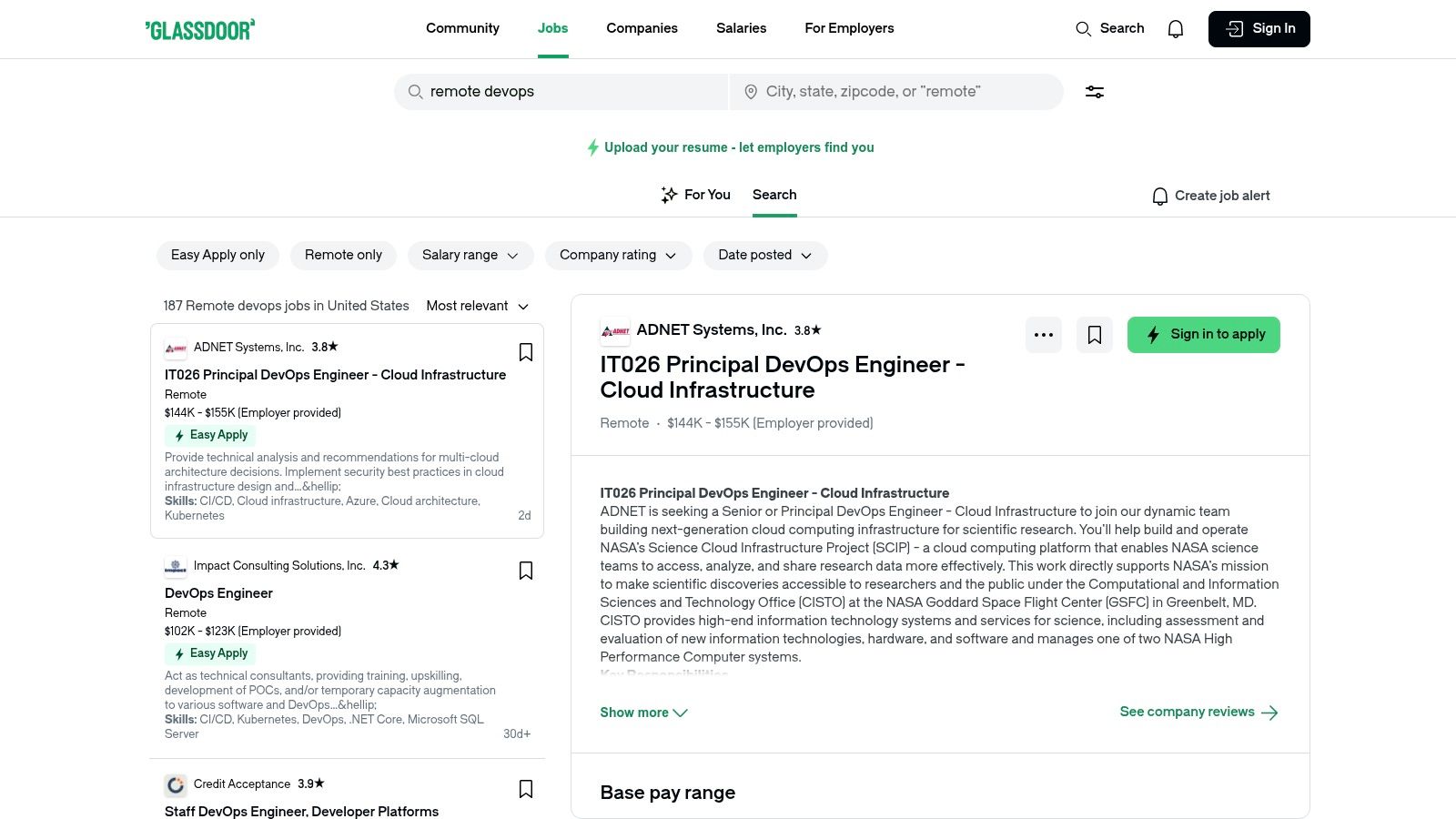
While the platform offers invaluable, user-generated insights for free, its primary weakness is the potential for outdated or biased information. A negative review might not reflect recent positive changes in an engineering department. Therefore, it's crucial to look for recent reviews (last 6-12 months) and analyze trends rather than focusing on single data points. Despite this, the sheer volume of data makes it a powerful research tool for due diligence.
Maximizing Your Glassdoor Search
To use Glassdoor effectively, combine job searching with deep company research. After finding a promising remote role, immediately navigate to the company’s profile to scrutinize its reviews, particularly those from the engineering department. Pay close attention to the "Interviews" section, where candidates often share specific technical questions ("How would you design a scalable CI/CD system?") and describe the take-home challenge or live coding session, giving you a significant competitive advantage.
- Pros: In-depth company insights beyond job descriptions; user-generated salary and interview data; free access to listings and information.
- Cons: Information can sometimes be outdated, unverified, or biased.
- Website: Glassdoor DevOps Engineer Listings
6. Dynamite Jobs
Dynamite Jobs specializes exclusively in remote work, making it a highly focused platform for finding legitimate, 100% remote positions. Every listing is manually reviewed, ensuring that opportunities are not only remote-first but also from established companies actively seeking talent. This curation is particularly valuable for DevOps professionals looking to sidestep the ambiguity of hybrid or "remote-friendly" roles often found on larger, more generalized job boards.
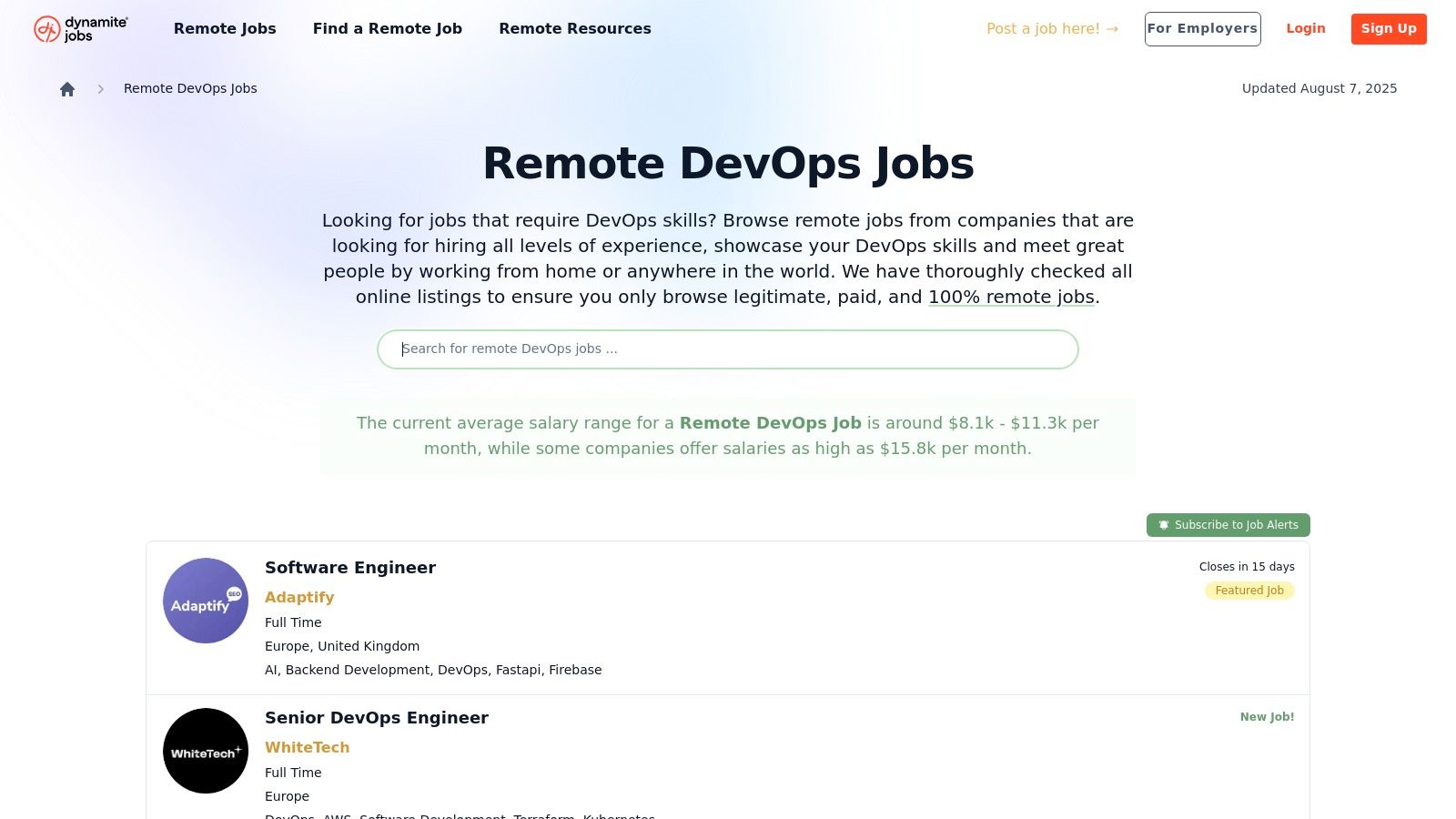
A key differentiator for Dynamite Jobs is its commitment to transparency. Many listings include clear salary ranges, allowing you to assess compensation before investing time in the application process. This free-to-use platform provides a straightforward search experience, although its niche focus means the volume of remote DevOps engineer jobs may be lower than on massive aggregators. However, the quality and relevance of the available positions often compensate for the smaller selection.
Maximizing Your Dynamite Jobs Search
To effectively use Dynamite Jobs, set up targeted email alerts for the "DevOps" skill category. Since the filtering is less granular, use the main search bar with specific technologies like "GCP," "Pulumi," or "DevSecOps" to uncover hidden gems. Also, pay close attention to the company profiles linked within job descriptions. These often provide valuable context about the company's culture and remote work policies, helping you tailor your application and determine if it's the right technical and cultural fit.
- Pros: Curated 100% remote roles; salary transparency is common; free for job seekers.
- Cons: Smaller pool of listings compared to larger job boards.
- Website: Dynamite Jobs DevOps Listings
7. We Work Remotely
We Work Remotely bills itself as the largest remote work community in the world, and for good reason. It stands out due to its exclusive focus on remote-only positions. This specialization means every listing for a remote DevOps engineer job is genuinely remote, eliminating the noise of hybrid or location-specific roles. The platform’s straightforward, no-frills interface makes browsing new opportunities in its dedicated "DevOps and Sysadmin" category a quick and efficient process.
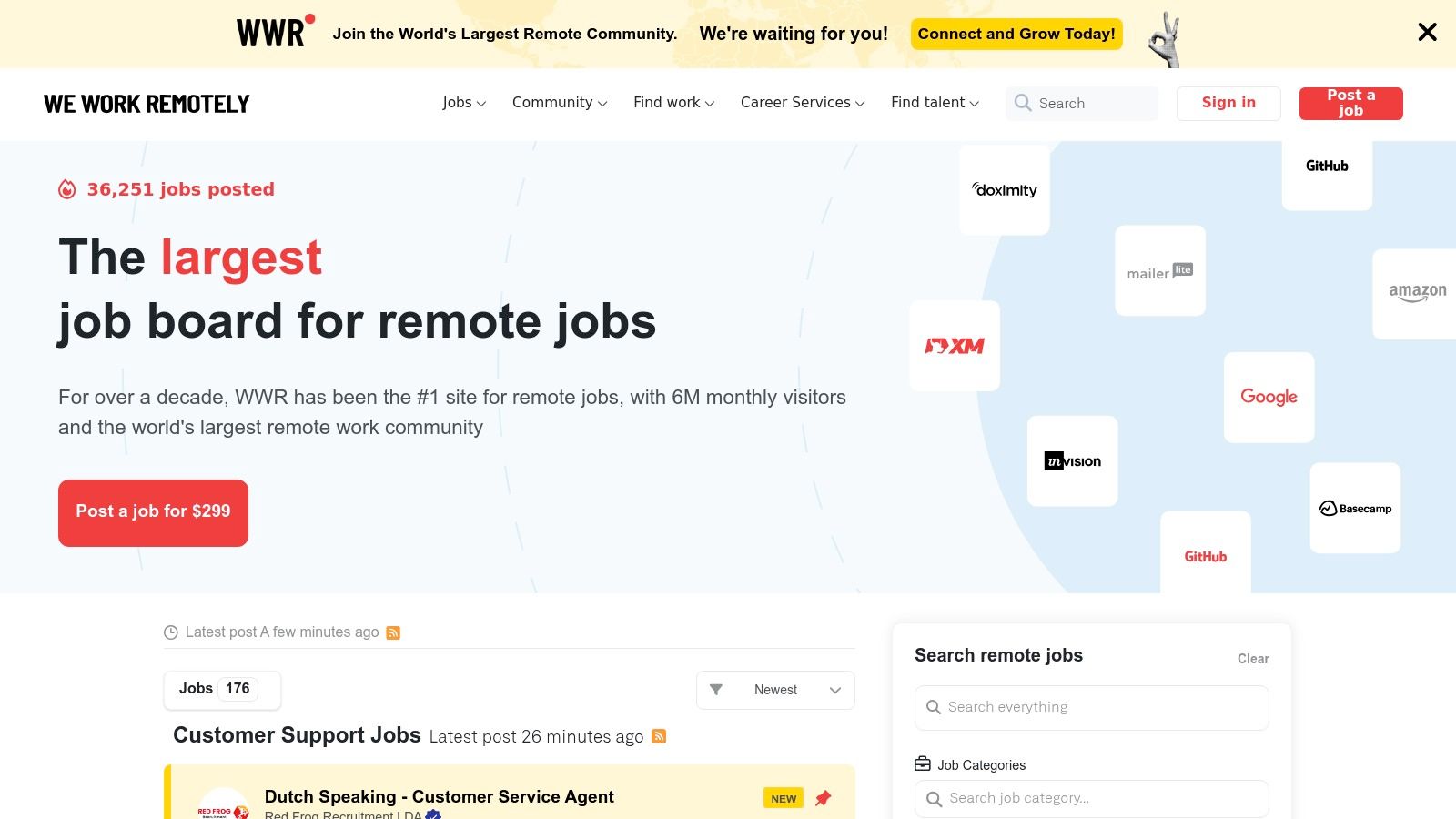
The primary advantage of We Work Remotely is its accessibility. It is completely free for job seekers, and you can browse and apply for roles without needing to create an account. The main drawback is its simplicity; the search and filtering capabilities are less advanced than on platforms like LinkedIn. You can filter by category but lack granular controls for specific technologies, experience levels, or time zones. This necessitates a more manual approach to sifting through listings.
Maximizing Your We Work Remotely Search
To use the platform effectively, use the main search bar with specific keywords like "Kubernetes," "AWS," "CI/CD," "Ansible," or "Terraform" in addition to "DevOps Engineer." Since many postings highlight security responsibilities, demonstrating knowledge of modern security paradigms is a plus. You can learn more about DevOps security best practices to strengthen your profile. Regularly checking the "DevOps and Sysadmin" category is the most direct way to stay updated on the latest openings.
- Pros: Exclusively remote positions; free for job seekers; no account required to browse.
- Cons: Limited search and filtering options; less detailed company profiles than other sites.
- Website: We Work Remotely
8. Upwork
Upwork operates as a massive freelance marketplace where businesses post projects and independent professionals bid for the work. For experienced professionals, this model provides a direct channel to find contract-based remote DevOps engineer jobs ranging from short-term consultations on CI/CD pipeline optimization with Jenkins or GitHub Actions to long-term, full-time equivalent infrastructure management projects on GCP or Azure.

The primary trade-off is the highly competitive bidding environment and the platform's service fees, which start at 10% and decrease with higher lifetime billings with a client. This can initially drive down rates. However, by building a strong profile with a portfolio of successful projects (e.g., public GitHub repos with Terraform modules you've written), DevOps engineers can command premium rates and secure consistent, high-value work, effectively running their own consultancy through the platform.
Maximizing Your Upwork Search
Success on Upwork requires a strategic approach. Create a specialized profile that highlights your expertise in specific tools like Kubernetes, Terraform, or AWS. Instead of generic bids, write highly customized proposals that directly address a client's pain points and technical requirements. For example, if a client needs help with AWS costs, mention your experience with tools like CloudHealth or AWS Cost Explorer. Leveraging the "Talent Badge" system (e.g., Top Rated, Expert-Vetted) significantly increases visibility and credibility.
- Pros: High volume of diverse project-based work; flexibility to set your own rates and schedule; potential for long-term client engagements.
- Cons: Competitive bidding can suppress rates; platform service fees reduce overall earnings.
- Website: Upwork DevOps Listings
9. Freelancer
Freelancer operates as a massive global marketplace where businesses post projects and freelancers bid to complete them. For a DevOps engineer, this means access to a constant stream of short-term gigs, contract roles, and even long-term projects. Instead of applying for traditional salaried positions, you compete for specific scopes of work, such as setting up a CI/CD pipeline, configuring Kubernetes clusters, or managing AWS infrastructure for a startup. This model provides unparalleled flexibility to choose your projects and clients.
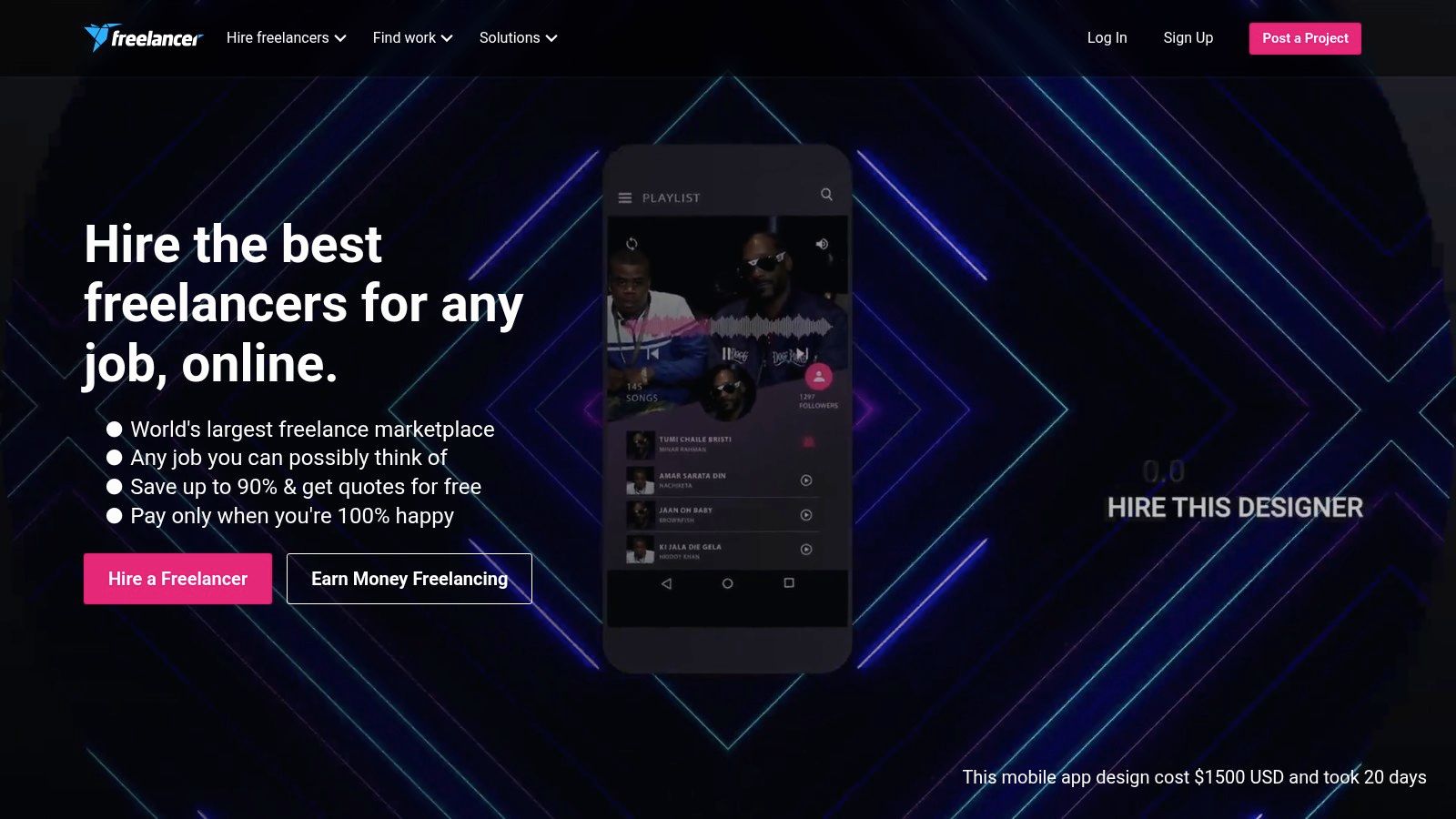
The platform's primary challenge is the intense competition and the bidding system, which can sometimes drive down project rates, especially for standardized tasks. However, its milestone payment system offers a secure way to manage financials, releasing funds only when specific deliverables are met. For DevOps engineers looking to build a portfolio with diverse projects or supplement their income with freelance work, Freelancer is a valuable resource for finding remote DevOps engineer jobs on a project-by-project basis.
Maximizing Your Freelancer Profile
To succeed on Freelancer, create a highly detailed profile that showcases your technical certifications (e.g., CKA, AWS Certified DevOps Engineer) and a portfolio of past work with concrete metrics. When bidding, write custom proposals that directly address the client's technical problem. Instead of "I can do this," write "I will configure your GitLab CI pipeline using shared runners, caching dependencies to speed up build times by ~40%, and deploy the artifact to your S3 bucket." This level of detail stands out and justifies a higher rate.
- Pros: Access to a large number of projects; flexibility to choose projects and clients; secure milestone payment system.
- Cons: High competition among freelancers; service fees can reduce overall earnings.
- Website: Freelancer
10. Fiverr
Fiverr offers a unique, entrepreneurial approach for freelance DevOps engineers to find project-based work. Instead of applying for jobs, you create "gigs"—packaged services that companies can purchase directly. This model allows you to productize your skills, offering specific, well-defined tasks like "I will set up a CI/CD pipeline for your Python app," "I will write Terraform modules for your VPC," or "I will implement monitoring for your application using Prometheus and Grafana." This is less about finding a full-time remote DevOps engineer job and more about building a portfolio of specialized, high-demand services.
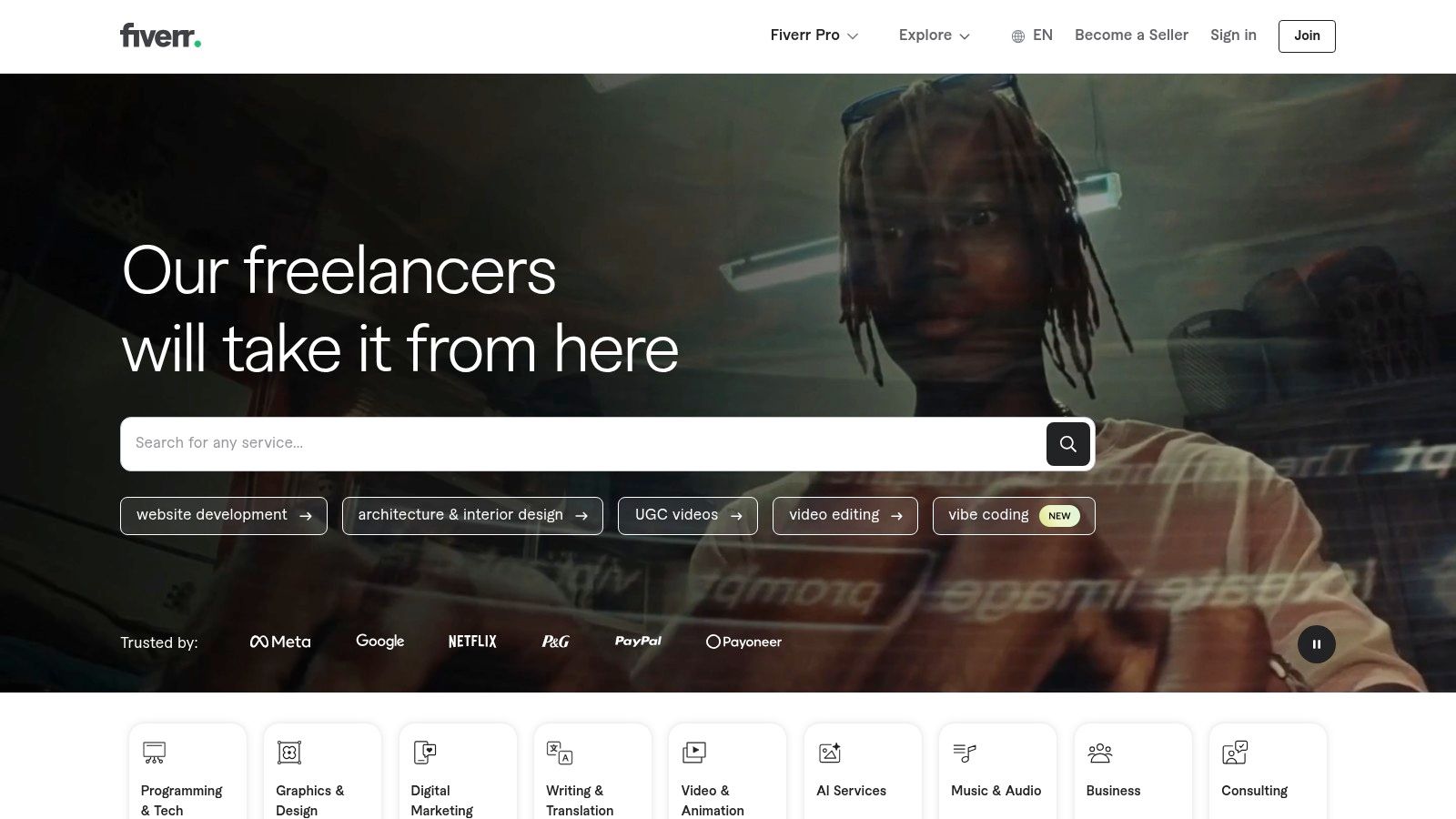
The platform's main challenge is the high level of competition and the 20% commission on all earnings. However, it empowers you with complete control over your pricing and service offerings. You can structure your gigs in tiers (Basic, Standard, Premium), upselling clients on more comprehensive solutions like adding automated testing, security scanning (e.g., Trivy), and deployment to multiple environments. For engineers who excel at marketing their expertise, Fiverr provides a direct channel to a global market.
Maximizing Your Fiverr Gig
To succeed, create highly specific gigs that solve a common business pain point. Instead of a generic "DevOps Services" gig, offer something like "I will set up GitHub Actions to build, test, and deploy your Node.js application to AWS ECS Fargate" or "I will optimize your AWS EKS cluster for cost and performance." Use clear, technical descriptions and showcase past results in your portfolio (e.g., screenshots of Grafana dashboards you've built) to build trust and attract the right clients.
- Pros: Full control over service offerings and pricing; high visibility on a major freelance platform; opportunity to build a personal brand.
- Cons: High 20% service fee on all earnings; significant competition requires strong self-marketing to stand out.
- Website: Fiverr DevOps Services
11. PeoplePerHour
PeoplePerHour operates as a freelance marketplace where businesses connect with skilled professionals for project-based work. While not exclusively for tech, it offers a steady stream of opportunities for freelance DevOps engineers to engage in specific, time-bound projects. This platform is ideal for those seeking flexibility and variety, allowing you to find remote DevOps engineer jobs ranging from short-term consultations on CI/CD pipeline setup to longer-term infrastructure management contracts. The project-based nature lets you build a diverse portfolio across different industries and technologies.

The platform's primary model involves freelancers submitting proposals for client-posted projects, which can be highly competitive. A key feature is the escrow system, which holds client funds and releases them upon project completion, providing a layer of financial security. However, freelancers should be mindful of the service fees, which are tiered based on lifetime earnings with a specific client and can be significant for new users.
Maximizing Your PeoplePerHour Search
To succeed on PeoplePerHour, create a compelling profile that highlights your specific DevOps expertise, such as experience with AWS, Kubernetes, Terraform, or Ansible. Instead of just bidding, create and post your own fixed-price "Offers" for common tasks like "I will set up a Jenkins CI/CD pipeline" or "I will configure your AWS environment using Terraform." This proactive approach attracts clients looking for quick, defined solutions and helps you stand out from the competition by productizing your skills.
- Pros: Flexibility to choose projects and clients; opportunities for both short-term and long-term work; secure escrow payment system.
- Cons: High service fees for new freelancers; competitive bidding process can drive down rates.
- Website: PeoplePerHour
12. Arc.dev
Arc.dev positions itself as a premium talent network, connecting pre-vetted developers and engineers with high-quality, permanent remote roles. For those seeking remote DevOps engineer jobs, this means access to curated opportunities that are often not advertised elsewhere. The platform goes beyond a simple job board by providing comprehensive support throughout the hiring process, from technical interview preparation to salary negotiation assistance. This hands-on approach is designed to match skilled engineers with their ideal long-term positions at well-funded startups and established tech companies.
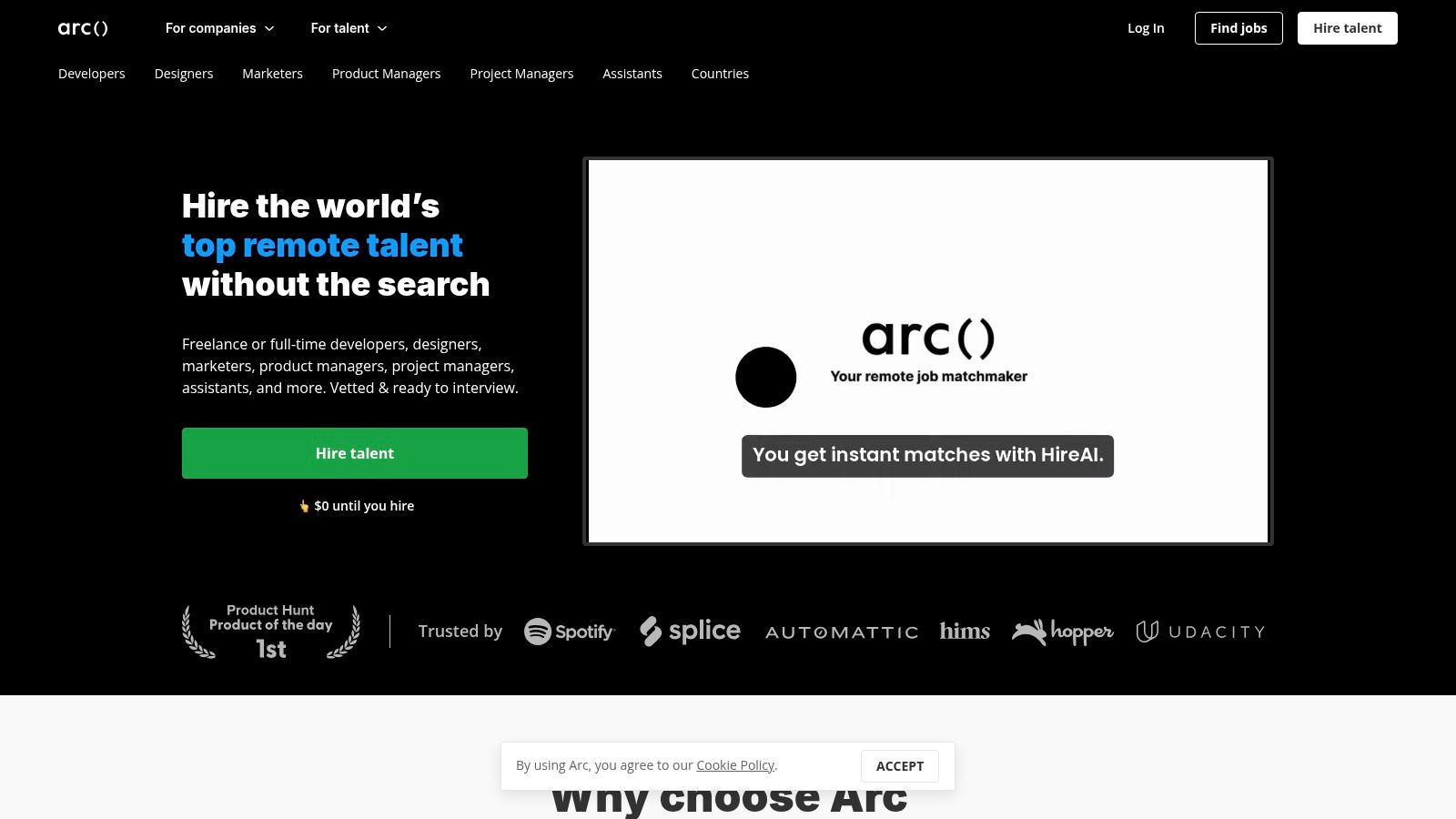
The primary trade-off is the platform's selective nature. To gain access to the full-time job marketplace, DevOps engineers must pass a rigorous technical vetting process that includes a resume screen, a behavioral interview, and a technical interview or coding challenge. While this creates a barrier to entry, it also ensures that the talent pool is highly qualified, giving successful candidates a competitive edge and a strong signal of quality to hiring managers.
Maximizing Your Arc.dev Search
To succeed on Arc.dev, treat the initial vetting as your first interview. Thoroughly prepare for the technical screening by refreshing your knowledge of systems design, networking fundamentals, and core DevOps tools. Be ready to discuss your experience with CI/CD, IaC (Terraform, CloudFormation), and container orchestration (Kubernetes) in depth. Once approved, work closely with their team to refine your profile and leverage their insights on salary benchmarks to ensure you receive a competitive offer.
- Pros: Focus on high-quality, full-time remote positions; support throughout the hiring process; access to an exclusive network.
- Cons: Selective application and vetting process may limit immediate access for some candidates.
- Website: Arc.dev
Top 12 Remote DevOps Job Platforms Comparison
| Platform | Core Features & Services | User Experience & Quality | Value Proposition | Target Audience | Price Point / Fees |
|---|---|---|---|---|---|
| OpsMoon | Top 0.7% global DevOps engineers matched, free planning, flexible engagement (consulting, delivery, hourly) | Free architect hours, real-time progress monitoring, continuous improvement | Tailored end-to-end DevOps support, scalable & cost-effective | Startups, SMBs, enterprises | Custom pricing; inquire directly |
| FlexJobs | Curated flexible, remote & freelance job listings | Hand-screened jobs, career coaching | High-quality vetted listings | Remote workers & freelancers | Subscription fee required |
| Extensive job listings, professional networking | Integrated profiles, job alerts | Free job access, direct recruiter contacts | Professionals across industries | Free | |
| RemoteRocketship | Daily updated remote DevOps jobs with salary info | User-friendly filters, salary transparency | Focused remote roles, free access | Remote job seekers | Free |
| Glassdoor | Job listings plus company reviews, salary & interview insights | User-generated reviews, detailed company info | Comprehensive employer insights | Job seekers & researchers | Free |
| Dynamite Jobs | Curated remote jobs with salary ranges, email alerts | Simple interface, free access | Transparent salaries, remote focus | Remote job seekers | Free |
| We Work Remotely | Remote-only job board | No account needed, updated regularly | Exclusive remote jobs, free access | Remote job seekers | Free |
| Upwork | Freelance project bidding, global clients | Secure payments, flexible project choices | Wide project variety, global freelancing | Freelancers & clients | Service fees (varies by freelancer level) |
| Freelancer | Project bidding, contests, portfolio showcase | Milestone payments for security | Large project database | Freelancers & clients | Service fees |
| Fiverr | Custom gigs with tiered pricing | Upfront payment, high competition | Freelancers control offerings & pricing | Freelancers & small clients | 20% service fee |
| PeoplePerHour | Offers posting, escrow payments, freelancer community | Flexible project choices, global clients | Secure payments, community support | Freelancers & clients | Service fees |
| Arc.dev | Curated full-time remote listings, interview & salary support | Professional community, hiring support | Quality positions, hiring process help | Developers seeking remote jobs | Free |
From Job Search to Job Offer: Engineering Your Next Remote DevOps Role
Navigating the landscape of remote DevOps engineer jobs is no longer a simple search; it's a complex engineering challenge in itself. The platforms we've explored, from specialized talent marketplaces like Arc.dev and OpsMoon to broad-spectrum giants such as LinkedIn and Glassdoor, each offer a distinct set of tools and opportunities. Your success hinges on moving beyond passive browsing and adopting a proactive, multi-platform strategy.
The key takeaway is that no single platform is a silver bullet. A diversified approach is crucial for maximizing your visibility and capturing the right opportunities. For instance, while Upwork and Fiverr are excellent for building a portfolio with smaller, short-term projects, platforms like We Work Remotely or Dynamite Jobs are better suited for landing long-term, full-time positions at remote-first companies. Your choice of platform should align directly with your career goals, whether you are a junior engineer seeking experience or a seasoned SRE targeting high-impact, high-compensation roles.
Your Strategic Action Plan
To transition from candidate to new hire, you need an actionable roadmap. Implement these steps to engineer your job search for maximum effectiveness:
-
Platform-Specific Optimization: Don't use a one-size-fits-all profile. On LinkedIn, tailor your headline and "About" section for recruiter search algorithms. On freelance platforms like Upwork, build a portfolio with specific case studies ("Reduced AWS bill by 25% through instance rightsizing and Spot implementation"). For specialized boards like RemoteRocketship, ensure your skills section is dense with keywords like Terraform, Ansible, Kubernetes, and CI/CD pipeline automation.
-
Build a Public Portfolio: Your work is your best resume. Create a public GitHub repository showcasing your Infrastructure as Code (IaC) projects (e.g., a reusable Terraform module for deploying a VPC), CI/CD pipeline configurations (
.gitlab-ci.ymlor GitHub Actions workflows), or custom automation scripts (e.g., a Python script for automating security group audits). Link to this portfolio prominently on every platform. This provides tangible proof of your technical expertise. -
Master the Asynchronous & Virtual Process: Remote roles are secured through remote processes. The hiring pipeline will almost certainly involve virtual interviews and possibly a take-home technical challenge. Prepare for this by ensuring your technical setup is flawless and you can clearly articulate complex technical concepts over video. Mastering this stage is non-negotiable. For a deeper dive, reviewing 8 Crucial Virtual Interview Tips to Master in 2025 can provide a significant advantage, helping you present yourself as a polished, remote-ready professional.
The search for high-quality remote DevOps engineer jobs requires diligence, technical acumen, and strategic positioning. By leveraging the specific strengths of each platform discussed and presenting yourself as a problem-solver with a robust portfolio, you shift from being a job seeker to a highly sought-after engineering talent. The demand for skilled DevOps professionals who can architect, automate, and scale infrastructure from anywhere in the world has never been higher. Now you have the blueprint to find and secure your place within it.
Ready to skip the noise and connect directly with companies seeking elite, pre-vetted DevOps talent? OpsMoon specializes in matching experienced DevOps engineers with top-tier remote roles. Join OpsMoon today to access exclusive opportunities and accelerate your search for the perfect remote DevOps career.
